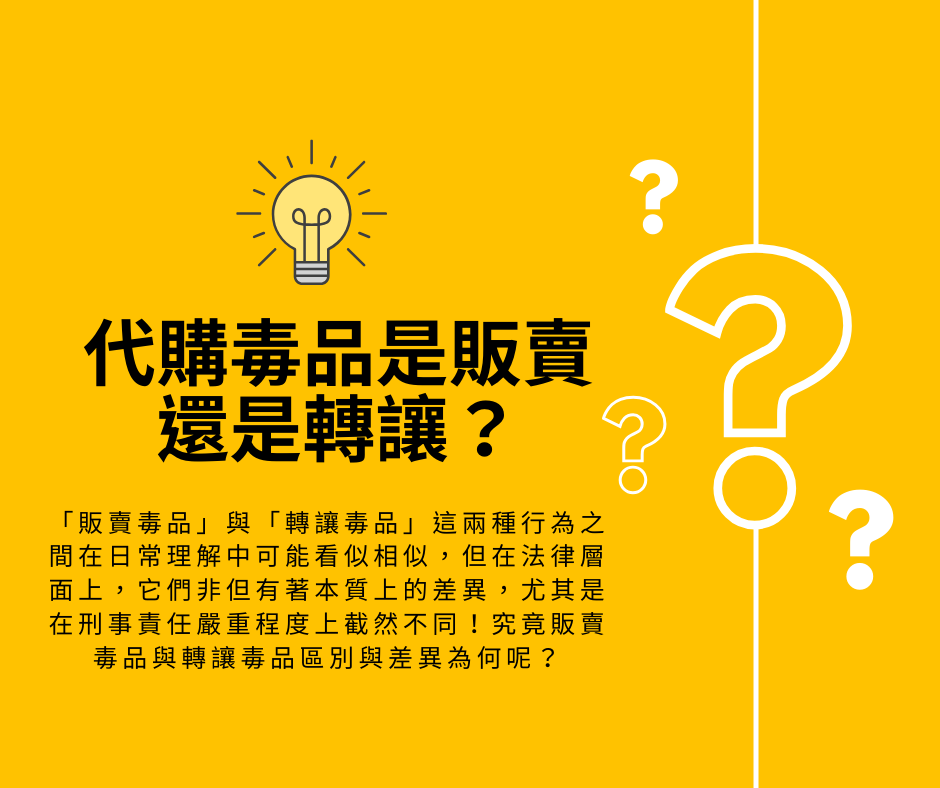首頁 > Case Studies
2024-02-27
Case Studies | Criminal Drugs | Selling Class 2 Drugs vs. Transferring Controlled Substances

The acts of 'selling drugs' and 'transferring drugs' may seem similar in everyday understanding, but they have essential differences at the legal level, especially in terms of the severity of criminal liability!
【Case Background】
The client of our firm was prosecuted by the prosecutor for selling Class 2 drugs and was judged by the district court under the Pharmaceutical Affairs Law for transferring controlled substances. The prosecutor believed that Witness A's testimony during the investigation and trial was inconsistent. However, considering the usual circumstances, the statements made by the witness during police questioning and investigation were closer to the time of the incident, likely more accurate, and thus highly credible. Since the witness had just been arrested, there was no time or opportunity to consider the impact of their statement on others, nor was there any chance of conspiracy. At that time, the witness did not face the defendant directly, meaning the psychological pressure was less, making it more likely to provide an accurate statement. However, the witness's testimony during the trial, which appeared to be made after weighing the serious crimes of themselves and the defendant, considering the impact of their testimony on the defendant, and thus fabricating excuses to protect the defendant, is very unreliable and cannot be accepted.Furthermore, the original judgment also determined that the defendant did not sell drugs to Witness A based on Witness B's testimony during the trial. However, Witness B stated during the investigation that they went to the location on the day of the incident, and on one occasion, did not see A and the defendant handling drugs. The original trial did not consider Witness B's statement of not seeing A and the defendant's drug transaction, directly concluding that the defendant did not sell drugs based on Witness B's lack of witnessing any negotiation between the defendant and Witness A, showing logical flaws in the reasoning.
【High Court: Appeal Rejected】
After our firm's investigation, we believe that the evidential strength should not be judged based on the chronological order of statements. The concept of 'initial statement under pressure' has no basis. According to the strength of evidence, although evaluated by the judge, the formation of conviction comes from the reasoning based on strictly proven evidence, usually relying on several complementary pieces of evidence to form a solid conviction. It is harder to achieve a correct conviction based on a single piece of evidence, especially evidence with a contradictory relationship, such as the buyer and seller in a drug transaction, the buyer might have been invited for a reduced sentence, leading to the possibility of untrue statements that benefit themselves at the expense of others.Such false and dangerous statements made by others than the defendant, to avoid blaming others and to uncover the truth of the matter, apart from using conclusive methods, cross-examination, and confrontation to ensure their truthfulness, it is still considered necessary to have corroborating evidence to enhance the credibility of their statements, enough to base the conviction of the defendant.
Therefore, the evidence presented by the prosecutor and the facts investigated by the court only show that Witness A's testimony was inconsistent, and its credibility is doubtful. Also, the testimonies of Witness B and others cannot be used to verify the truthfulness of Witness A's statements about the defendant selling drugs during police questioning and investigation. As for the prosecutor's appeal arguing that the original judgment did not consider Witness B's lack of observation of any negotiation between the defendant and A, since Witness B did not witness any negotiation regarding methamphetamine between the defendant and A, it naturally cannot have a positive effect on the conviction. Hence, the original judgment, synthesizing all the evidence, concluded that the part of the accusation of selling Class 2 drugs against the defendant could not be proven, discussing the reasons for the evidence selection and the inability to form a guilty conviction for this part without violating any empirical rules or logical rules of evidence law.
After our team of lawyers in Taiwan's High Court vigorously defended the defendant, the Taiwan High Court ultimately rejected the prosecutor's appeal, maintaining the original judgment of sentencing for transferring controlled substances.
Reference:Narcotics Hazard Prevention Act
[Continue reading:How many years will I be sentenced for drug trafficking?]
-
04.30 2024Case Studies
The Responsibility of Faculty Harassing Students!
-
04.23 2024Case Studies
Can compensation still be claimed if a contract te...
-
04.16 2024Case Studies
What is a guardianship declaration?
-
04.09 2024Case Studies
Sexual Autonomy Violation | Tricked in a Sex Trade...
-
04.02 2024Case Studies
Domestic Litigation | Spouse Secretly Installs Sur...
-
03.26 2024Case Studies
Can Accusations Be Made Years After the Relationsh...
-
03.19 2024Case Studies
Negligence of Supermarket! Joint Liability of Empl...
-
03.12 2024Case Studies
Defective Renovation Work and the Contractor's Ref...
-
03.05 2024Case Studies
Is it Wrong Just Because the Administrative Agency...
-
02.27 2024Case Studies
Criminal Drugs | Selling Class 2 Drugs vs. Transfe...
-
02.20 2024Case Studies
Civil Case | What to Do if Common Areas and Mechan...
-
02.06 2024Case Studies
What to do if you encounter a loan scam?
-
01.30 2024Case Studies
Paid the decoration deposit, but the construction ...
-
01.23 2024Case Studies
Fraud | Can you be sued for fraud just for online ...
-
01.16 2024Case Studies
Installing Own Surveillance Cameras, Does It Viola...